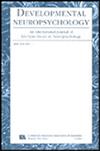幼儿量表误差的神经基础。
IF 1.6
4区 心理学
Q3 PSYCHOLOGY
Developmental Neuropsychology
Pub Date : 2021-03-01
Epub Date: 2021-02-14
DOI:10.1080/87565641.2021.1887871
引用次数: 1
摘要
在这项研究中,我们研究了2岁和3岁的儿童在参与近红外光谱测量的基于工具的尺度误差任务时是否表现出背外侧和腹外侧前额叶区域的激活。结果显示,在产生规模错误的儿童和没有产生规模错误的儿童之间,前额叶的激活没有显著差异。然而,我们发现,与自由游戏阶段相比,在尺度错误阶段前额叶区域显著激活。我们的研究结果并不否认,至少在一定程度上,前额叶区域的激活可能与儿童的尺度误差有关。本文章由计算机程序翻译,如有差异,请以英文原文为准。
Neural Basis of Scale Errors in Young Children.
In this study, we examined whether 2-and 3-year-old children exhibited activation in the dorsolateral and ventrolateral prefrontal regions while engaging in a tool-based scale error task as measured by near-infrared spectroscopy. Results revealed no significant differences in the prefrontal activation between children who produced scale errors and those who did not. However, we found significant activations of the prefrontal region during scale error sessions compared to free play sessions. Our results do not deny that the activation of prefrontal regions may, at least in part, be associated with children's scale error.
求助全文
通过发布文献求助,成功后即可免费获取论文全文。
去求助
来源期刊
CiteScore
2.80
自引率
6.70%
发文量
17
审稿时长
>12 weeks
期刊介绍:
Devoted to exploring relationships between brain and behavior across the life span, Developmental Neuropsychology publishes scholarly papers on the appearance and development of behavioral functions, such as language, perception, and social, motivational and cognitive processes as they relate to brain functions and structures. Appropriate subjects include studies of changes in cognitive function—brain structure relationships across a time period, early cognitive behaviors in normal and brain-damaged children, plasticity and recovery of function after early brain damage, the development of complex cognitive and motor skills, and specific and nonspecific disturbances, such as learning disabilities, mental retardation, schizophrenia, stuttering, and developmental aphasia. In the gerontologic areas, relevant subjects include neuropsychological analyses of normal age-related changes in brain and behavioral functions, such as sensory, motor, cognitive, and adaptive abilities; studies of age-related diseases of the nervous system; and recovery of function in later life.
Empirical studies, research reviews, case reports, critical commentaries, and book reviews are featured in each issue. By publishing both basic and clinical studies of the developing and aging brain, the journal encourages additional scholarly work that advances understanding of the field of lifespan developmental neuropsychology.

 求助内容:
求助内容: 应助结果提醒方式:
应助结果提醒方式:


